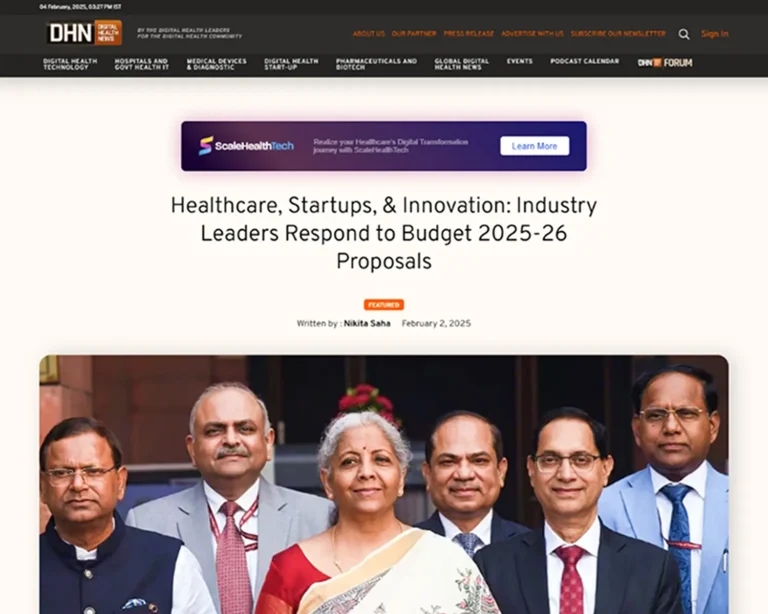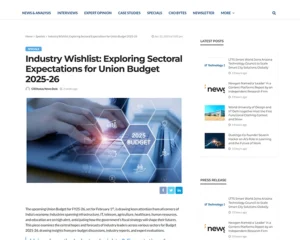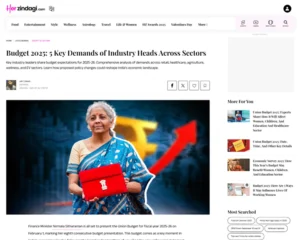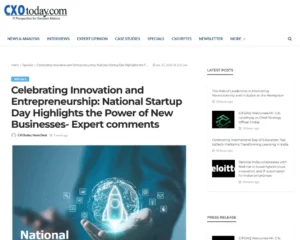The Union Budget unveiled yesterday brought a slew of announcements. In healthcare, the government plans to add medical seats, addressing the shortage of medical professionals. Gig workers will receive identity cards and registration through the e-Shram portal.
Further, a Deeptech Fund will be established to support technological advancements, especially in emerging sectors. The budget also introduced customs duty exemptions on life-saving drugs.
Additionally, the government will set up 200 cancer daycare centers. Moreover, with the ‘Heal in India’ initiative, the focus is on boosting medical tourism through partnerships with private sector stakeholders, capacity building, and streamlined visa norms to attract international patients.
Insights from Key Players
The Union Budget 2025-26 has sparked a range of reactions from industry leaders, particularly with its focus on healthcare and startups.
Ameera Shah, Executive Chairperson of Metropolis Healthcare, praised the significant reforms in the healthcare sector, particularly the expansion of medical education, the strengthening of the Heal in India initiative, and the promotion of medical tourism.
“Budget 2025-26 marks a significant step forward for India’s healthcare sector, reinforcing its role as a cornerstone of Viksit Bharat. Key reforms—expanding medical education, strengthening Heal in India, promoting medical tourism, allowing 100% FDI in insurance, extending PM-JAY to gig workers, enhancing cancer care affordability, and equipping primary healthcare with broadband connectivity—are crucial strides toward greater accessibility and equity,” she said.
She also emphasized the importance of diagnostics and preventive care. “However, to establish India as a global healthcare leader, greater emphasis on innovation in diagnostics is essential. Advancing precision medicine, strengthening preventive care, and improving access to diagnostic testing will accelerate progress. The expansion of broadband in primary health centres is a welcome move, enabling telemedicine to bridge rural-urban healthcare gaps.”
Shah concluded by highlighting areas that still need attention, particularly in tax policy. “While the budget lays a strong foundation, critical areas like GST rationalisation in healthcare require urgent attention. Increasing the tax exemption for preventive health check-ups, extending benefits to multiple family members, and integrating outpatient diagnostics into insurance packages will significantly enhance affordability and encourage proactive health management. We look forward to continued dialogue and effective implementation to build a more resilient, inclusive, and future-ready healthcare system.”
Sushanto Mitra, CEO of Lead Angels, praised the dedicated Startup Fund of Funds and enhanced credit guarantees for SMEs, which he believes will improve capital access and foster innovation.
“The National Manufacturing Mission creates new opportunities for startups aligned with ‘Make in India,'” he added, though he noted that broader tax incentives for startup investors could have further boosted capital inflows. “We look forward to policy refinements that drive sustained entrepreneurial growth,” Mitra concluded.
Adrija Agarwal, Vice president and Business Developer, Sattva Group, ‘said, ”The ₹10,000 crore Fund of Funds for startups and extended 100% tax deductions under Section 80-IAC will fuel entrepreneurship and job creation. I commend the government for prioritizing the middle class and startups and look forward to witnessing the positive effects of these reforms in our communities.”
Similarly, Hanuman Tripathi, Partner at Lead Angels, emphasized that the measures will help founders focus more on scaling their businesses by easing regulations and improving access to capital.
“The Union Budget 2025-26 is a boost for startup founders, strengthening ease of doing business and improving access to capital,” Tripathi said.
“The dedicated Startup Fund of Funds and enhanced SME credit guarantees will help founders secure much-needed funding, while streamlined regulations reduce compliance burdens. The focus on manufacturing through the National Manufacturing Mission also creates new opportunities for startups aligned with ‘Make in India.’ With these measures, founders can spend less time navigating red tape and more time building and scaling their ventures. This is a step in the right direction for India’s entrepreneurial ecosystem.”
Dr Apurba Ganguly, Founder of Nano Phyto Care & bioGAN, welcomed the increased allocation for digital health initiatives and preventive care, highlighting the potential for these measures to enhance patient outcomes and drive innovation.
“At VarcoLegCare, we welcome the increased allocation towards digital health initiatives, preventive care, and medical R&D. These measures will enhance patient outcomes and drive innovation in the sector. The emphasis on public-private partnerships aligns with our mission to deliver advanced, patient-centric solutions,” he said.
“We remain dedicated to leveraging these opportunities to expand quality healthcare access, particularly in underserved areas. This budget is a step forward in building a resilient, technology-driven healthcare ecosystem for a healthier future.”
Abhi Sinha, Co-Founder of HealSpan, praised the budget’s focus on expanding health coverage and promoting AI-driven diagnostics.
“The 2025 Budget highlights a progressive approach to healthcare and insurance technology, reinforcing the need for digital transformation in the sector. At HealSpan, we applaud the government’s focus on expanding health coverage, AI-driven diagnostics, and interoperability of medical records. The push for insurtech innovation and greater accessibility to affordable policies will empower millions. Strengthening data security frameworks will also ensure patient trust in digital healthcare solutions. This budget paves the way for a more inclusive, tech-enabled ecosystem, and we remain committed to leveraging these advancements to enhance seamless, efficient, and personalized healthcare experiences for all,” Sinha said.
Sharing thoughts, Dr Mandeep Singh Basu, Director, Dr Basu Group, said, “We are really encouraged by the recent budget, as it addresses key areas in both healthcare and MSMEs. The proposal to add 10,000 medical seats and create 75,000 over the next five years will help meet the growing demand for healthcare professionals, while the establishment of 200 cancer centers in FY 2025-26 will significantly improve cancer treatment access across the country. On the MSME front, the budget is a big boost, with the investment and turnover limits being enhanced, benefiting over 5.7 crore MSMEs that employ 7.5 crore people and account for 36% of manufacturing and 45% of exports. Additionally, the increase in credit guarantee cover for micro and small enterprises from ₹5 crore to ₹10 crore will make ₹1.5 lakh crore in credit available over the next five years. This budget is truly a step forward in supporting growth and innovation in these critical sectors.”







